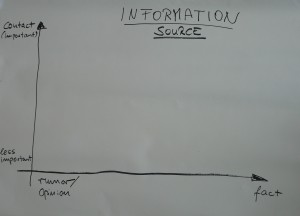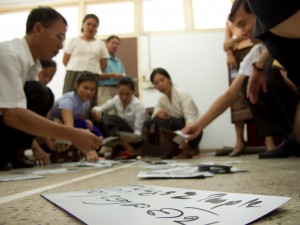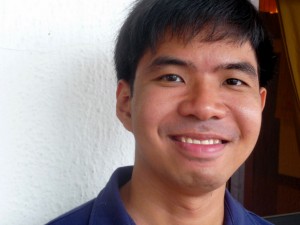Using an “axis of importance” diagram to evaluate sources
 Out of one workshop at NUOL came a good tool that fits perfectly into that quest. It’s a diagram that helps journalists evaluate their sources (see photo at left, click to enlarge).
Out of one workshop at NUOL came a good tool that fits perfectly into that quest. It’s a diagram that helps journalists evaluate their sources (see photo at left, click to enlarge).![]() read more
read more
An inside look at Bhutan’s first TV program for kids
Thinley Yangchen Dorji, a producer at the Bhutan Broadcasting Service Corporation (BBS), takes us on a tour behind the scenes of Bhutan’s first homegrown TV show for kids. Called “My World”, it’s a 30-minute program for youngsters aged eight to twelve that began airing regularly in January. Welcome to “My World”!
Prior to “My World” there were no Bhutanese television programs for children. Foreign programming available via satellite was entertaining but had little educational value. Pema Choden, BBS’s General Director until the end of March 2011, approached DW-AKADEMIE for support. Her aim was to have a quality program tailored to children in Bhutan.
![]() read more
read more
Educators embark into a new era of journalism in Laos
 Is there a proper definition of journalism in the Lao language? Since DW-AKADEMIE’s first workshop on journalism at the National University of Laos in Vientiane, there is. It was conceived by 15 staff teachers of the Department of Mass Communication at the Faculty of Letters – after long discussions revolving around somewhat abstract terms like “media”, “the public”, “society” and “information”.
Is there a proper definition of journalism in the Lao language? Since DW-AKADEMIE’s first workshop on journalism at the National University of Laos in Vientiane, there is. It was conceived by 15 staff teachers of the Department of Mass Communication at the Faculty of Letters – after long discussions revolving around somewhat abstract terms like “media”, “the public”, “society” and “information”.
Lao is not a language that lends itself to describing abstract ideas. Yet the 15 teachers feel it was worth the effort to lay a foundation they now can build upon. They are learning the mindset, tools and skills that in combination make a journalist. The reasoning behind this is that they are the ones training a new generation of Lao students who are eager to take on the profession.
![]() read more
read more
Creating a new morning show in Vietnam
What does it take to produce a successful radio program? And how can you motivate the people in northern Vietnam's Quang Ninh Province to tune in? That's what the radio staff of Quang Ninh Radio & TV and DW-AKADEMIE are exploring at the moment in cooperation with Friedrich Ebert Stiftung and Vietnam's Academy of Journalism and Communication.
This week, DW trainers and QTV radio journalists drew up plans for a new morning radio show. It will be called "QTV Rush Hour" and will run between 6:30 and 7:30 every morning. The show will include music, information and audience participation elements.
On Thursday, March 31st, the Vietnamese journalists recorded a pilot for the new morning show. If all goes well, the show will start airing live next month.
Text and pictures: Thorsten Karg, DW-AKADEMIE trainer
How media in the Philippines report on Japan
By Leo Gatdula, Manila
 The powerful earthquake that rocked Japan on March 11, 2011 is big news in the Philippines not only because of the extent of the disaster itself, but also because there are about 300,000 Filipinos in Japan.
The powerful earthquake that rocked Japan on March 11, 2011 is big news in the Philippines not only because of the extent of the disaster itself, but also because there are about 300,000 Filipinos in Japan.
The Philippine media have focused their coverage on the plight of Filipinos working in the richest country in Asia. Every day, Filipinos in the Philippines are provided with reports about how much some Filipinos in Japan want to return to the Philippines and how they are coping with the tragedy.
Focusing on Filipino workers in Japan
Overseas Filipino Workers (OFWs) in Japan and other parts of the world send billions of dollars back home, helping keep the Philippine economy afloat. It’s one of the reasons why they’re called “modern-day heroes” in the Philippines.
Thus, an OFW-related event is bound be an emotionally charged issue in the country. Whether it’s Filipino sailors seized by Somali pirates or Filipino workers fleeing violence-torn Libya, an OFW-related event will get big-time coverage in the Philippines.
![]() read more
read more







